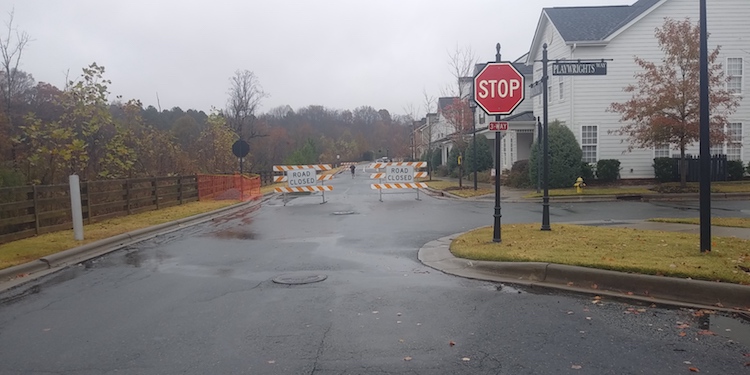
Street ownership twists and turns
April 16. By Dave Vieser. There’s a big pothole in the road outside your home–not a surprise given the rainy winter—but who do you call to get it fixed? It could be the state, the town, your homeowners association or a developer who still owns the road.
Such is the dilemma facing property owners, like those who live in the Antiquity development, where some roads still have not been turned over to the town years after they were constructed.
Here’s how the process works: If you live on a state maintained road, such as Bethel Church Road or Washam Potts Road, where there are quite a few homes, it’s simple. You notify the NCDOT.
Some neighborhood streets can get more complicated: The private owner or developer has the initial responsibility to fix the road. Depending on how the community is structured, a homeowner would contact either their HOA or the owner themselves.
Eventually, the private developer can request that the town take over jurisdiction for maintaining roadways after the development is complete. However, that shift in responsibility is not automatic.
The town inspects the roads carefully to be sure the pavement, sidewalk and curbing meets specifications. Once they are satisfied that it does, a resolution must then be approved by the town board at a regular public meeting accepting maintenance responsibilities for the specifically named roads.
Usually this happens within a few years of final sub division completion, sometimes sooner, but in the case of some roads in Antiquity, it has taken much longer.
“I can tell you Cornelius is in no rush to take ownership of some Antiquity Roads,” a town official told Cornelius Today. “We are requesting that they be brought up to our standards.” Sinkholes have been an issue in the neighborhood.
Once the road is turned over to the town, all of the maintenance responsibility shifts to Cornelius. However, there is

GRANT
some financial help provided by the state through legislation known as the Powell Bill. Adopted in 1951, it was the successful result of a 15-year effort by the League of Municipalities to have the state fund the building and maintenance of major city and town streets. Using funds derived from a gasoline tax, the bill provides money directly to municipalities, based on their population and street mileage, to maintain streets that are not part of the state highway system.
In the current fiscal year, for example, the town received $778,252 in Powell Bill allocations. “The majority of those funds went towards resurfacing town-maintained roads” said Town Manager Andrew Grant.
“Powell Bill funds also go toward town-maintained sidewalk repair and construction.”
About this time, a homeowner might ask how they can tell which type of road they live on. There’s a map at the link below which identifies which jurisdiction is responsible for every road in the town—state, town or private.
Now you know!
https://www.cornelius.org/DocumentCenter/View/96/Powell-Bill-Map



